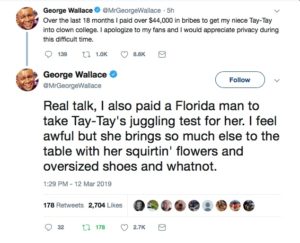 Sara Mead on why curriculum and teacher quality are not either/ors. Max Marchitello and Justin Trinidad with a new analysis about lessons MSI’s can teach more generally about training teachers to work with diverse populations. Here’s Justin on the ed school faculty piece of that conversation.
Sara Mead on why curriculum and teacher quality are not either/ors. Max Marchitello and Justin Trinidad with a new analysis about lessons MSI’s can teach more generally about training teachers to work with diverse populations. Here’s Justin on the ed school faculty piece of that conversation.
Meanwhile, Brookings asks if the teaching force is becoming more diverse?
This college admissions scam is something. Good reminder that even schools that claim not to care about athletics do. Good reminder about…well about a lot of things.
Rick Hess returns to a familiar topic for him, the education sector is biased left. This time it’s with Jay Greene and looks a political giving from ed types. You probably already heard about it on Twitter.
The study design has some serious limitations – it’s only federal giving, which is only tracked above certain amount thresholds, it looks at that giving over time but only a snapshot of who foundations support, doesn’t look at for-profit educational firms and companies, doesn’t look comprehensively at state based organizations (which are more ideologically diverse) and business groups and others, and most importantly the heterodoxy/amount of viewpoint diversity of various organization is probably not well represented by political giving because people choose to give or not give for all sorts of reasons. In addition, there is no reason to assume that education types are any more likely to be single issue voters than others. So for instance someone could think that the Jeb Bushs, Brian Sandovals, and Bill Haslams of the world are good to work with on education policy but nonetheless not support them for office financially or otherwise for other reasons. This is the position a lot of Democratic education reformers find themselves in. On that note, it’s also impossible not to note the irony that many reformers who are quite left leaning in their politics – Don Hirsch, Howard Fuller for instance – are nonetheless constantly identified as right wing. The politics of this sector are bananas.
All that said, while this study seems set up to provide the bleakest possible take, it’s silly to deny that this issue of ideological homogeneity is a real phenomenon in our sector. Of course it is. It profoundly affects how we think about the range of available policy choices among other things – and is one reason a Hirsch or Fuller can seem right wing, to a hammer everything’s a nail. Even accounting for the limits of the analysis the figures in the report are startling. Likewise, even accounting for some curious methodological choices that excluded some groups that have received Gates money and that seem likely to lean more R, I’d be amazed if there is even rough parity with broader demographics. It’s a problem and while on the one hand schools are inherently political creations and always have been (just ask Socrates) to the extent partisanship and inflexible ideologies infuse the sector it is an issue given the diversity of the public pubic schools serve, and as on other issues of diversity one the sector, should seek to do better on.
On this particular aspect of diversity Bellwether does more than most, has some internal systems to try to check this, and we are generally somewhat unique in our approach and priority on this – it was refreshing to see some folks point that out unsolicited on Twitter last week given that our approach to this carries also real costs because it’s such a polarized time – but we have work to do, too. In any event, when the dust settles I assume that this will result in some new grant money for some right-leaning groups and genuine heterodoxy will continue to remain homeless because it’s out of fashion right now on the left and on the right.
Bottom line: Two things true at once, some problems with this analysis but also some problems with ideological diversity in the education sector and the ed reform part of that sector.
Here’s Beth Hawkins on the report.
Elsewhere in Rick Hess, he wants an executive order from the president on campus free speech and makes the case here. Free speech and academic freedom are real issues, but an EO seems like a deliberately politically charged way to get at it and exactly the kind of executive overreach/potential for unintended consequences people were concerned about with the previous president.
“It’s all about the kids” is a throwaway line but Tim Daly stops to ask some hard questions about New York.
If you’re not in Austin here’s an interesting discussion on school choice and race and how wokeness seems to stop at the schoolhouse realtor’s door. Some history, too.
Steve Lopez on charter schools in LA.
A Detroit principal on school improvement:
My children were in private school. I pulled my children from private school because I felt DEA could match any private school education.
Wondering what’s working and what’s not in Denver? Start here.
Cami Anderson talks with Christy Coleman.
Guys, you are not going to believe this. Turns out it’s not just curriculum.
Guns in schools – and probably not what you think.
Colleges don’t recruit as much in rural communities, and it shows. You hear compelling stories about this from rural college students and less compelling interest from a lot of college administrators.
